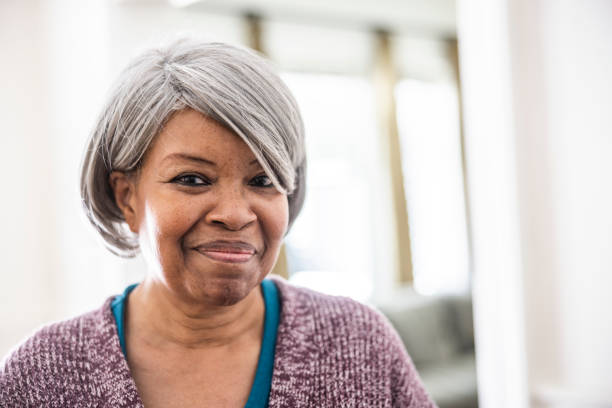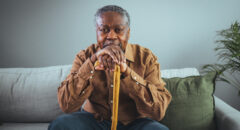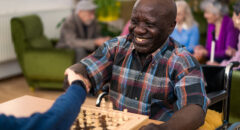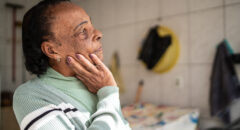
For 30 years, Robyn Yale has been on a mission to raise awareness that people with early-stage Alzheimer's disease can still lead rich, active lives. A licensed clinical social worker who practices in the San Francisco Bay Area, Yale says that the early stage of the disease is different from what happens in the middle and later stages. People in the early stages are healthy, high functioning, and in many cases able to express feelings, concerns, and experiences.
"At the beginning of the illness, a person is only having mild memory loss or confusion," she says, "yet it's significant enough to disrupt many aspects of life. People may find it difficult to stay at a job, or do certain things the way they were always able to do them. In many other ways, however, they are able to care for themselves, communicate, and be social."
Warning signs
Alzheimer's disease (AD) is the leading cause of brain damage in old age, affecting one in eight adults over 65, and roughly half of those 85 and older.
Warning signs include poor judgment, loss of initiative, a tendency to misplace things, recent memory loss that affects job performance, problems with abstract thinking, a declining ability to perform routine tasks, and unusual changes in mood or behavior. While these signs alone do not indicate AD, early diagnosis is important to determine if these symptoms indicate a diagnosis of AD, another dementia, or a treatable condition.
According to the Alzheimer's Association, the time from onset of symptoms until death ranges from three to 20 years. Yet most programs for people with the disease and their caregivers and families focus on later stages, when cognitive and physical impairments are pronounced and often agonizing, and the person with the disease may not be able to discuss his or her condition. Yale's long crusade has helped spur a boom in early-stage support groups and education nationwide, primarily through the Alzheimer's Association.
"We are refuting blanket stereotypes," she says. "For years, family members in early stages had to go to existing support groups, where they would hear about all kinds of issues they were not ready to deal with -- such as wandering, incontinence, nursing home placement. In early stages, they're just beginning to learn how to face the disease and how to adjust family relationships."
RELATED: Early Detection of Alzheimer’s Makes a Difference
A world of possibilities
This new awareness of early-stage possibilities has also spurred new research and treatments. According to the American Medical Association, the most radical change on the horizon may be diagnosing Alzheimer's before symptoms appear or when a patient has mild cognitive impairment, considered to be a precursor to the disease.
"What the new therapies are doing is pushing clinicians to make diagnoses earlier," says Mark A. Sager, M.D., chief of operations of the Wisconsin Alzheimer's Institute at the University of Wisconsin Medical School at Madison. "The earlier you can diagnose someone with Alzheimer's disease, the more likely you are to keep that person in the home and maintain their levels of functioning."
The key to discovering and diagnosing early-stage AD is for family members to be observant -- but not to overreact and jump to the inappropriate conclusion that any significant change in a loved one's behavior is a sign of the disease. There are many steps in the process of diagnosing Alzheimer's, including reviewing the family medical history, doing a physical exam to asses nutrition, vital signs, and organ disorders, running laboratory tests to rule out other disorders, and doing an in-depth psychiatric exam to rule out other causes for dementia.
A physician will also evaluate the patient's mental status (testing for a sense of time and place as well as the ability to remember words and to do simple calculations or drawings) and do a neurological exam for evidence of strokes, tumor, coordination and muscle tone. Many other illnesses, including depression, can resemble Alzheimer's, as can symptoms caused by harmful drug interactions.
Early diagnosis may also lead to early treatment with some of the new drugs that have proven effective in slowing the progression of memory loss and improving the quality of life for many patients. Ask your doctor about galantamine (Razadyne), memantine (Namenda), donepezil (Aricept) and rivastigmine (Exelon). Some researchers are also investigating the potential of turmeric (a cooking ingredient often used in Indian curries) and fish oil containing omega-3 fatty acids as weapons against the plaque build-up often seen in Alzheimer's, and one has even recommended a weekly cup of turmeric tea containing 1 gram of turmeric power, milk, cinnamon and black pepper as a possibly preventative measure. No studies to date, however, indicate that these two dietary measures help slow down Alzheimer's once it has set in.
Research also indicates that regular exercise can slow the progression of Alzheimer's disease. Walking a mile a day -- or the equivalent of 10 city blocks -- may keep the disease at bay for years, according to some researchers.
Focusing on the special needs of people with early-stage AD has also opened a world of possibilities for families. Early on, when impairment is mild, it's best to concentrate less on incapacity and more on what people can still do. People in the early stages of the disease can take advantage of recreational, social, educational, and vocational programs. And support groups for both caregivers and care receivers go a long way toward keeping families functioning and intact, Yale observes.
"Support groups for people with the disease are just as beneficial as groups for family members. It is actually a very powerful experience: They wind up feeling less alone, getting information and emotional support, and sharing coping strategies."
RELATED: These 5 Behavior Changes Could Be Early Signs Of Alzheimer’s
9 tips for coping
Here are the most important steps experts recommend for coping with a diagnosis of early-stage AD:
- Join a group -- in person or online -- for education and support.
- Help your loved one get his legal and financial affairs in order, including making a living will and granting you power of attorney for health care and for finances. Talk with them about their health care wishes while they can still understand and reason, and use these discussions to guide future decisions. Organize financial documents such as birth certificates, insurance policies, retirement accounts, and Social Security information, and keep them all in one place.
- If he or she is still driving but you have concerns, talk with their doctor, who can order a regular driving test or a specialized one for people with AD. This is especially difficult in the very early stages of the disease, when things are not black and white. If nothing else, place limits on driving distance, driving alone and at night, and so on.
- If he or she manages their own medications, count doses to see if proper amounts are being taken. A segmented pillbox will help monitor medication use. Make sure each medicine is necessary and that none are considered dangerous for persons with dementia (in particular, ask your physician about anticholinergics, insulin, or sedative-hypnotics).
- Automate as many functions as you can, such as check deposits and bill paying, but keep your loved one involved.
- Consider Meals-on-Wheels if the person with Alzheimer's is living alone and you are concerned about adequate nutrition.
- Try to talk to your loved one about long-term care plans, such as who she wants to manage her affairs and health decisions. It is essential that she grant power of attorney for finances now, even if you don't use it at this time, because as the disease progresses and affects her reasoning further, she may be reluctant to turn over her affairs even to a close relative.
- Talk to the person's physician about clinical trials and discuss what range of early-stage programs are available in your area.
- Help your loved one continue pursuing friendships and interests and participating in everyday activities as much as possible, or modifying those activities as needed.
"A lot of things are positive," Yale says, "because people in early stages still have lots of abilities. The challenge is to go on with life. Their attitude becomes, 'Well, I'm not just going to sit around and wait to die or go to a nursing home.' So they have to figure out what they can still do, or start doing, to make life meaningful and possible. It's wonderful to see that happen."









